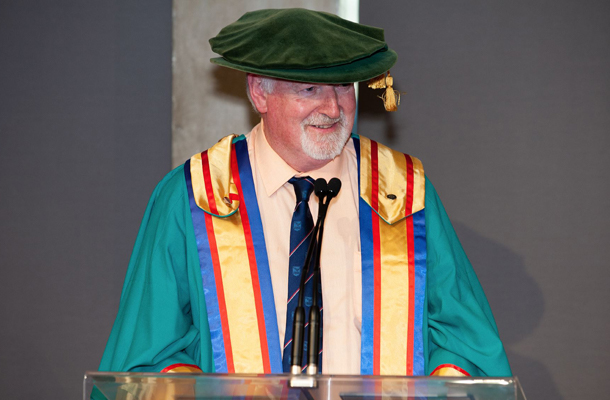
Executive summary
The Universal Business School Sydney (UBSS) commissioned Cyril Jankoff and Daniel Bendel to write a second book for them, a book on entrepreneurs. Its purpose is to give new local and international undergraduate and MBA students a feel of what every day Australian business success looks like. To give a realistic view of successful entrepreneurship the authors chose 15 successful entrepreneurs and will interview them. This is the seventh interview. Each interviewee will be asked the same questions and at a later stage the authors will review all interviews and summarise the commonalities. The focus of the cases is on Sections III to VI.
Key points from this interview:
- The difference between an entrepreneur and an intrapreneur.
- The importance of “skin in the game” (and the importance of being there and be involved)
- What you can learn from the metaphor of “spinning plates”.
- Beware of different cultural issues when dealing with legal matters.
- Have sufficient working capital to allow for volatility in the business.
Greg Whateley
He is always looking for new opportunities for development, which he sees as the calling of an intrapreneur (or also known as an “in-house entrepreneur”). He is Mr Spinning Plates”, as he uses his “spinning plates” analogy to run successful businesses. See below for further explanation of his “spinning plates” analogy.
An “intrapreneur” is an entrepreneur who starts ventures from within larger companies. They run the business as if it is their own, but it is not theirs. They:
- are involved with entrepreneurial activities within a company that receive organisational sanction and resource commitments for the purpose of innovative results.
- Infuse entrepreneurial thinking into large bureaucratic structures, including corporations and governments.
- Are known as ‘corporate entrepreneurs’ in the US.
I. Key dates
- 1954: Born in in Melbourne.
- 1975: Diploma of Teaching (focusing on Music and Psychology)
- 1985: Bachelor of Education (focusing on Music)
- 1989: Master of Education (focusing on Assessment and Evaluation)
- 1990: Graduate Diploma in Educational Administration (focusing on Organisational Behaviour)
- 1991: Married to Gabrielle (has two daughters)
- 1997-1999: Academic Manager – Professional Initiatives Unit – Griffith University, Queensland.
- 2000: To remain with secure employment he declines an offer from Pearson PLC, the listed global English publisher to the Australian and Oceanic manager of their Financial Times Knowledge (FTK) division.
- 2003: Doctor of Professional Studies (focusing on Virtual Pedagogy)
- 2000 - 2003: Head – School of Arts, Central Queensland University; Associate Professor and Director – Central Queensland Conservatorium of Music; Manager - Business Initiatives, Faculty of Education and Creative Arts – Central Queensland University;
- 2004 - mid 2005 Professor and General Manager – The Australian Institute of Music, Sydney.
- 2005 - 2007: Director, Education and Quality– National Centre for Language Training – University of New South Wales (Sydney); Chair – UNSW Global eLearning Steering Group; Chair – UNSW Global Strategic Improvement Project; Chair – Wesley Institute Academic Board (2007 – 2008)
- 2008 -2010: Principal and Professor – Australian International Conservatorium of Music (incorporating Australian International Performing Arts High School); Consultant – Creative Industries - University of Western Sydney College; Consultant – Graduate Studies - The Australian Institute of Music; Consultant – Master of Music – Wesley Institute.
- 2011-2014: Deputy Dean – UWS College, University of Western Sydney; Chair – Academic Board – Australian Institute of Music.
- 2014-early 2016: Dean and Professor – The College, Western Sydney University; Chair – UBSS Academic. Board; Chair – Academic Board - Australian Institute of Music; Chair – Musicum20 International Music Symposium.
- 2016-2020: - Executive Dean – Universal Business School Sydney.
- 2020: Greg is currently the Deputy Vice Chancellor at Group Colleges Australia. In July 2019 he was appointed Emeritus Professor.
II. Getting to know the person
1. What is success?
Greg sees success as establishing new initiatives that reach fruition and achieve two things: (1) demonstrate a good return on investment; and (2) provide a quality outcome, which is evidenced by objective statistical analysis, student feedback and Commonwealth government QILT (Quality Indicators for Learning and Teaching) surveys.
Due to Greg’s direct involvement UBSS’s QILT scores are now well above the National average. Greg is an advocate of Lord Kelvin, the Irish Engineer, who wrote “What you can’t measure you can’t manage”. Peter Drucker, the well-known American management theorist, was in the latter part of the twentieth century a great advocate of this same philosophy.
2. What is your favourite TV show, movie or book and why?
- TV Program: Greg’s favourite TV show is NCIS – tracking down the bad guys using a mix of ‘gut’, teamwork and technology.
- Movie: Greg loves the Da Vinci Code movie and likes to compare the movie to the book. He likes the intrigue of the storyline. He has visited many of the spots in the movie. He also likes the similar Angels and Demons book which is a sequel to the Da Vinci Code film.
3. What are your hobbies and/or interests?
Greg has little in the way of hobbies other than collecting wine for his cellar. He has about 800 bottles. Work has always served as both entertainment and focus for him. Although he is a trained and skilled musician, and worked as a professional musician, he does not see music as a hobby but rather another enjoyable aspect of business. He tells the story of when running the Central Queensland Conservatorium, the Conservatorium had a $500,000 piano in its own room. He used to get into work early to play it. He saw this as a perk of the job.
III. Tips
4. How did you get through your worst times?
Greg considers that when the going gets tough one needs to focus, stay calm and put in the extra hours needed. One of his students was having difficulty in completing their work and Greg tells of how he told this student Rob, now a successful university academic, “to sleep less and work more”. Greg offered the following tip: “Work hard and be good to your mother”. That is, think of your parents and thank them for all the sacrifices they have made for you, and your siblings.
Authors note: All jokes aside we all need a reason to get out of bed or otherwise we can have too much time for worry.
5. What keeps you awake at night?
He responded: “Nothing really”.
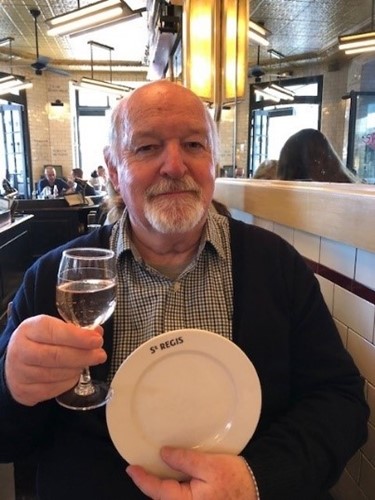
Greg relaxing in Paris in pre-COVID-19 days
6. What are your typical daily routines?
Greg considers that he has a standard routine. After a day’s work there is dinner, he watches NCIS with family members and then in bed by 10 pm. He is up at 5 am the next morning and spends the first 4-5 hours of the day working through emails and outstanding tasks and prefers to complete outstanding issues early before meetings. He believes in standard routines as a way of helping him run the organisations that he controls. He uses the “spinning plates” metaphor, which is his way of saying that a leader must do enough to keep everything running smoothly and do not touch the things that are spinning (working) well.
There are exceptions to the above standard daily routine. An example is when he overviews a number of international programs, where he needs to be available during a far wider range of hours to fit in with overseas time scheduling.

The “spinning plates”
The “spinning plates” image was burnt into Greg’s consciousness during a visit to Shanghai where a street performer had some 20 or so spinning plates operating outside a shopping mall entrance. Transfixed, he realised it was a metaphor, in fact, for running a successful business. It was a matter of maintaining a complex set of elements all spinning without falling. On closer examination the performer’s management of the plates was the essence of quality management – touch only the sticks (poles) of the plates that looked as though they were waning – leave the others alone. Good management then is knowing which plates (poles) to gently massage – and which to leave alone.
7. What advice would you give yourself starting out?
Focus from the start. Work out what is important and what is not, and what you can achieve and what you cannot. He reminds us of the saying, “Know what you can control and what you cannot and have the wisdom to know the difference”. He said that when he was young, he perhaps tried to do too much. For example, he worked in several business improvement roles and then moved on once he had implemented the improvements. Along the way he realised that a good manager should not mess with things that work, and this realisation was the genesis of his “spinning plates” philosophy.
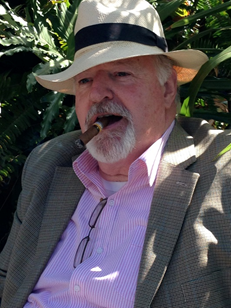
Greg pondering the next project
IV. Business case examples
8. Provide a case you managed well and why?
In 2015 Greg joined Universal Business School of Sydney which is a Division of Group Colleges of Australia (GCA) as Chair of the Academic Senate and in 2016 transferred full-time as Executive Dean. During that time, he grew the business from 400 students to 1650 students, with 60% of them being postgraduate. Greg feels that this is a good example of strong leadership, industry knowledge and team effort to think creatively to obtain growth and quality outcomes. Greg had previously accomplished a similar successful result with The College at the University of Western Sydney (UWS).
Authors’ note: When we asked how UWS fared since he left, Greg noted that he sees no benefit in looking back. He prefers to concentrate on the present and future.
9. Provide a case that did not go well and why?
Case study 1 – as an intrapreneur: “the Japanese program”
Greg ran a graduate program in Film and Television Music in Tokyo Japan on behalf of a local Japanese university for two years. He never visited the site. He essentially sub-contracted the program. Greg feels that the program may have failed because of the lack of his day-to-day attention and personal involvement. Normally Greg would invest his time and energy in running programs to make sure they grow, including communicating with the people directly and would meet with them regularly. However, due to Greg’s heavy workload in Australia, and the time drain of needing to spend a day travelling each way to Tokyo he deferred the travel. The program eventually petered out. Compounding the matter was the cultural issue in the way that contractual matters were dealt with.
Greg’s employer’s solicitors provided a 30-page detailed contract with the usual “remedies for breach” and “damages” which are normal in the English-based commercial contract world, such as Australia, but were frightening to a Japanese college head who obviously had not had much contact with Western commerce. It is interesting to note that Greg was looking at a similar project in Singapore but this time he advised the Singapore college Principal to use the Principal’s own lawyers to write the contract. Greg learnt from his experience and the Singapore project was a great success. It expanded to the Singapore military but did not proceed due to the Asian Financial Crisis in the late 1990s.
Case study 2 – as an entrepreneur: “Hector the Cat”
In Greg’s early career he was offered the job of writing the “Hector the Cat” song for a road safety campaign. See image and link below. He received a very large fee for this song. After this success Greg was very confident that he had a career in writing music and promptly resigned from his university position. After four months obtaining no further work, he realised how difficult it was to make a living in the music industry, and went to see his old boss to ask if he could rejoin the university. It is interesting to note that his former employer laughed when Greg returned stating that he knew that Greg would be back, and kept his resignation in the desk drawer and then handed it back to Greg who tore it up. The advertisement was extremely successful and ran all over the world. Greg noted that had he been on a royalty payment basis he would have earned millions!

From this experience Greg learned that stable employment has its advantages. In the 1990s Cyril Jankoff was completing his MBA and became friendly with the management of the UK listed global publishing company Pearson PLC. Pearson advised Cyril that it was looking for senior management staff to open their Asia Pacific regional office in Melbourne in early 2000. Cyril agreed to attend a meeting with the UK staff when they came to Melbourne to recruit. Cyril and Greg both attended the meeting and Greg was offered the position of Australia and Oceania regional manager for Pearson’s Financial Times Knowledge (FTK) division relating to the sale of Person’s accumulated knowledge to universities. Greg considered the offer but declined it stating that he did not want to give up a secure university position for such a new position with no guarantees of future employment. FTK then offered the position to Cyril. Greg was very sensible because within two years the office closed due to unviability of the product in the Australia and Oceania oceanic region. Cyril returned to his business education and consulting practice. Except for his short time as a self-employed songwriter, Greg has never deviated from working entrepreneurially for others.
10. What conclusions can be drawn by comparing these cases?
Greg considers that there are two conclusions:
- The first is that success is about being there, physically and mentally and having what is colloquially known as “Skin in the game”.
Skin in the game: The origin of the phrase comes from southern derby races in the USA. The owners of a horse have “skin” in “the game”. As the owner, they have the most riding on the outcome of the derby event.
Steve Jobs humorously explains his version of “skin in the game”
- The second conclusion is the importance of being aware of the different cultural attitudes. In the Japanese case it was the different attitude to legal contract formats.
- With regard to creative endeavours (that is Hector) – always get yourself a good lawyer and a solid contract.
- Manage your risks proactively.
11. What cultural issues did you experience? How were they overcome? How is Australia different? Were these cases affected by cultural issues?
Greg has taught and/or researched in four Australian States and five countries. He has lead programs in four countries. He has experienced a range of differences but has always been able to work closely with partners and overcome any obstacles. He is closely aware of cultural issues because in addition to the above when he worked at the National Centre for Language Training at the University of New South Wales, they received a $7- 8 Million Federal grant to assist exporters understand foreign culture.
Greg notes that humour and behaviour often do not translate across cultures well, and each culture has its own peculiarities and subtleties. He remembered a joke about a grasshopper that always gets many laughs in Australia, and indeed he told the joke when interviewed in an ABC radio interview, where the laughter interrupted the interview. However, when he told it in Japan there was not a single laugh. The joke was an example of the fact that many things do not translate. The joke was: ‘A grasshopper goes into a bar in Tokyo – the bartender says we have a drink named after you – the grasshopper replies – what Shintaro?’
Greg also advises that often the way that negotiations are conducted, and how you behave in them, is culturally specific, and thus it is important to understand this. For example, he was involved in a Middle Eastern deal where an offer was made, and he later realised some of the aspects of the offer were not negotiable due to their culturally specific background. It is also a culture where ‘yes’ does not necessarily mean yes.
Apart from the contractual issues mentioned, Greg found no significant issues in dealing with different cultures.
V. Volatility (For example COVID-19)
The following refers to COVID-19 but can be used as an example for all types of business volatility that may arise in business.
12. How has the virus affected your business?
UBSS has suffered in terms of international student numbers – but otherwise has fared remarkably well. Not a single member of staff has directly or indirectly been retrenched or made redundant as a result of COVID-19, which is a strong result compared to many other educational institutions. UBSS invested heavily into technology with moving cameras and associated support technology. This made the on-line experience interesting and life like – no boring lecturers standing in one spot and lecturing the whole time. This classroom style experience of the on-line learning led to high quality education and high student satisfaction survey results. The advantage UBSS has is in its successful hybrid model of in-house and online learning. The COVID-19 virus was a disaster, but it did not have to mean failure.
13. What lasting impact do you think it will have on your business?
The shift to online learning (accompanied by blended learning) will stay with them for some time. In many ways the shift is a game-changer. This is discussed in a number of articles Greg has published in Campus Review throughout 2020 and 2021. There may well be other long-term effects such as being acclimatised to replacing face-to-face meetings with on-line meetings savings substantial costs and travel times. It will present challenges for teaching modes and the need to come up with entertaining and engaging options.
14. What have you learned from it that you will now implement in your business?
Greg thinks the main learning is that you need to move quickly when circumstances change. Many businesses run a risk register and even have a comprehensive crisis response strategy but would still not have been ready for the COVID-19 crisis which was like a sledgehammer. Will businesses relax back within few years? Perhaps. Greg says it is imperative to have sufficient working capital to manage the ups and downs of businesses. This was vital with the COVID-19 crisis. Many businesses will not have had the financial strength to be able to recover after the government support finished.
VI. Family business
15. Are you in a family business and from your experience what do you think are the advantages and disadvantages of family working in the business?
The answer to the first part of the question is that Group Colleges of Australia (GCA), is owned by the Manly family and it employs family members, but Greg is not a part of the family, but he has the unofficial title of being the in-house entrepreneur for the Manly family business. He gets on well with the Manly family members who treat him as if he is part of their family.
The answer to the second part of the question is that GCA is a family business which has done well. Greg thinks families can operate a business, or businesses, and succeed. He also thinks a smart family business includes quality support people who know what they are doing. This “family” culture can extend to a kind of “extended family” of long-standing friends and business associates. Many successful businesses seem to have this “family feeling” embedded in the business.
Greg has had an extraordinarily successful career as the “in-house entrepreneur” (intrapreneur). He has always treated the businesses and their resources as if they were his own. This effectively gives him the important feeling of having “skin in the game”.
Authors:
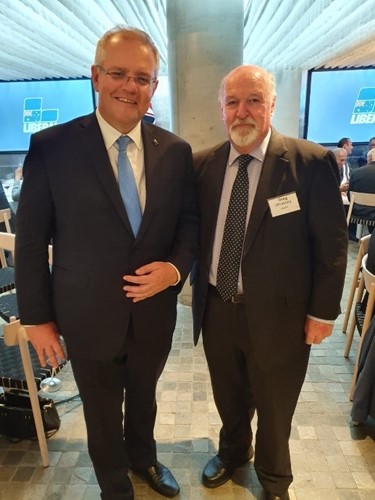
Greg and the Prime Minister in Sydney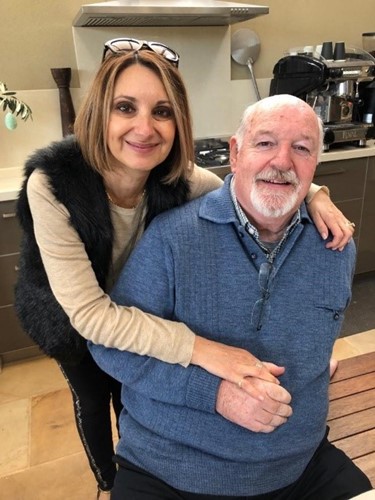
Greg and the real boss - Gabrielle




